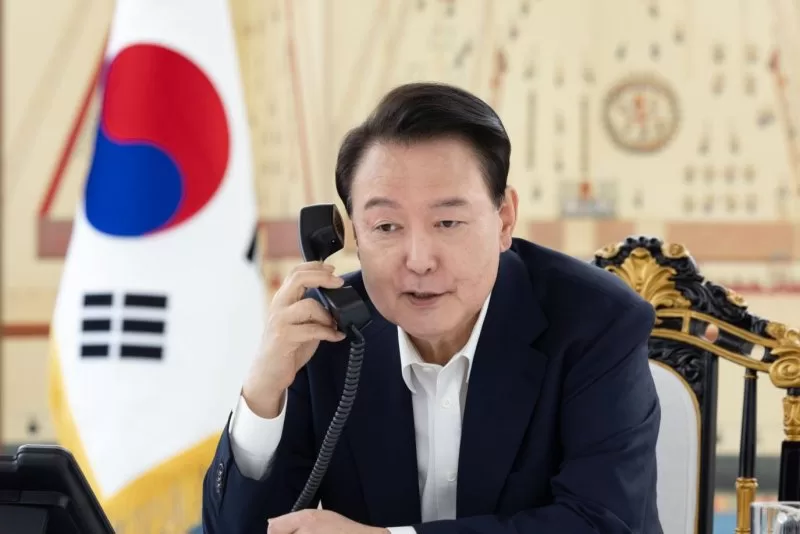South Korean President Yoon Suk Yeol congratulated U.S. President-elect Donald Trump during a phone call Thursday. The two agreed to meet in person soon, Yoon’s office said. Photo courtesy of South Korea Office of the President
SEOUL, Nov. 7 (UPI) — South Korean President Yoon Suk Yeol spoke with U.S. President-elect Donald Trump on the telephone Thursday and the two leaders agreed to meet in person as soon as possible, Yoon’s office said.
Yoon congratulated Trump on his “resounding” victory Tuesday, using the “Make America Great Again” slogan during a 12-minute call, Principal Deputy National Security Adviser Kim Tae-hyo said at a press briefing.
Trump and Yoon discussed Japan-South Korea cooperation, the U.S.-South Korea alliance and North Korea security issues, including Pyongyang’s recent deployment of troops to Russia, Kim said.
“Going forward, the South Korea-U.S. alliance will continue to be a close partnership that encompasses all areas of security and economy,” Yoon said during the call.
Trump expressed gratitude and the two agreed to set a date and location for an in-person meeting soon, Kim said.
During a press conference later on Thursday, Yoon said he has been told by U.S. lawmakers and former Trump aides that he will have “good chemistry” with the president-elect.
Questions have begun swirling around the future of the security relationship between the United States and South Korea, which grew significantly closer under Yoon and outgoing U.S. President Joe Biden.
During his previous term in office, Trump called for massive increases in Seoul’s financial contribution for the 28,500 U.S. forces stationed in Korea, at one point reportedly demanding a 400% hike from then-President Moon Jae-in and dragging negotiations out for months.
Last month, Seoul and Washington reached a new five-year cost-sharing Special Measures Agreement, under which South Korea will pay approximately $1.19 billion in 2026, an increase of 8.3%. The deal, which was signed Monday, calls for Seoul to annually raise its payment in line with the rise in the consumer price index.
Trump, however, may look to renegotiate the SMA. While campaigning last month, Trump called South Korea “a money machine” and said the country would be paying $10 billion a year had he remained in office.
Analysts also cautioned that Trump may circumvent the U.S.-South Korea-Japan trilateral alliance and restart negotiations with North Korea on his own.
Yoon has “invested so much in the U.S.-ROK alliance but now faces a U.S. President in Trump, who doesn’t necessarily value said alliance,” Sean King, senior vice president and East Asia expert at New York-based consulting firm Park Strategies, told UPI.
“Yoon faces a bumpy diplomatic road ahead as Trump may go around him to reengage North Korea’s Kim Jong Un while partner Japan is also in a state of political transition.”
Trump held two high-profile summits with Kim and met him briefly a third time at the DMZ while in office, although Seoul and Washington failed to reach a nuclear agreement. Trump later boasted that Kim wrote him “beautiful letters” and said the two “fell in love.”
At the Republican National Convention in July, Trump touted his personal relationship with the North Korean tyrant once again.
“I get along with him,” Trump said in his nomination acceptance speech. “I think he misses me, if you want to know the truth.”
North Korea has continued to develop its missile and nuclear programs over the past few years, with a steady stream of weapons tests and a growing military partnership with Russia.
On Tuesday, North Korea launched a salvo of short-range missiles into the East Sea, days after it test-fired a new solid-fuel intercontinental ballistic missile.
As of Thursday afternoon, North Korea had not reacted publicly to Trump’s victory.
